Table of Contents
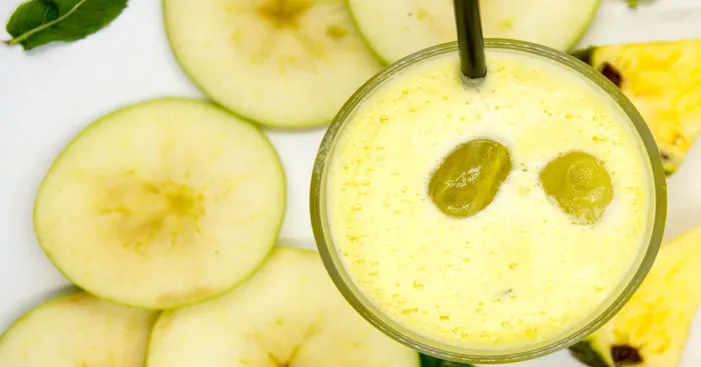
Apple juice nutrition info is rarely spoken about as we mostly have an already pre-mindset about it.
For instance, some would say since apples are full of health virtues then of course apple juice is full of nutrients.
While others are extremely against that as they claim that any fruit that goes through juicing process loses its health virtues.
This is exactly why we made this article, to get into details and discover what is the real health virtues of apple juice.
In this article, you will discover the real health benefits of apple juice based on scientific studies, what precautions you need to know before you consume apple juice, how to choose the best apples for juicing, how to make apple juice, and how to store apple juice to preserve its nutrients.
Which apple juice to choose?
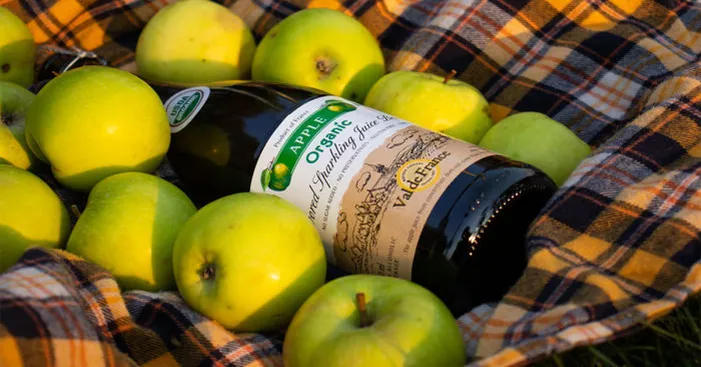
Apple is a very beneficial fruits thanks to its antioxidants but when it comes to apple juice, they differ.
In the market, you can find filtered apple juice or unfiltered apple juice and they don’t have the same nutrients.
For instance, apple peel contains a lot of vitamins, minerals, and antioxidants.
Industrial filtration basically separates the remaining apple peel pieces and water which take away many nutrients from the juice.
If you are not making your own apple juice at home, at least make sure you buy the right ones.
The juices you find in the market with labels such as “100% pure apple juice” or “pure apple juice” are usually natural and have more nutrients. (1)
You should avoid buying apple juice concentrates as they usually contain added preservatives, sugar, and even artificial flavors.
Apple juice nutrition info:
Apple juice calories:
Even though apples are made of more than 80% water, they are still full of minerals and vitamins.
Apple juice is just nutritious, it is a concentrated dose of many apples put into one drinkable juice.
This data counts for 1 cup of natural unsweetened apple juice (236ml): (2)
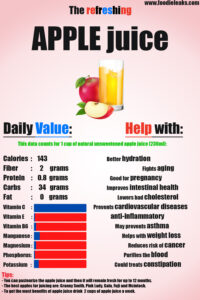
- Calorie: 143
- Protein: 8 g
- Carbs: 34 g
- Fat: 0g
- Fiber: 2 g
- C vitamin C: 120%
- E vitamin E: 2%
- B6 vitamin B6: 4 %
- Manganese: 11%
- Magnesium: 4%
- Phosphorus: 2%
- Potassium: 9%
Think of it: if “an apple a day, keeps the doctor away”, then how about 3 apples in 1 cup of apple juice?!!
To summarize the most abundant micro-nutrients in apple juice, here’s our list: (3)
- Phosphorus: Apple juice contains phosphorus, a mineral that strengthens the bones and teeth and helps fight insomnia.
- Quercetin: A plant-based flavonoid with unbelievable antioxidant properties that protect cells and help preserve memory.
- Pectin: a type of fiber that smoothens digestion, lowers cholesterol, and reduces blood sugar levels.
- Antioxidants: apple juice calories are low but they are full of antioxidants such as flavonoids, epicatechin, and procyanidin B2. (4)
This richness of polyphenols and antioxidants in apple juice is beneficial to counter tissue aging and reduce the risk of most diseases. - Fiber: Apples contain insoluble and soluble fibers and most of the fibers are indeed destroyed during the juicing process.
- However, only insoluble fibers are destroyed and there is a good amount of soluble fibers in apple juice.
- Those soluble fibers in apple juice limit the diffusion of sugar in the blood and stabilize glycemia.
- Vitamin C: Natural homemade apple juice usually contains very little vitamin C around 2% of the daily need.
- Nonetheless, commercial apple juice offers more than 100% of the daily need in vitamin C.
- This is because vitamin C is added to apple juice to extend its shelf life and preserve other polyphenols. (5)
Apple juice health benefits:

Apple juice is full of essential nutrients and offers a long list of health benefits including:
Anti-inflammation properties:
Apples contain a lot of polyphenols which are plant compounds that include flavonoids and quercetin. (6)
Most of these plant nutrients are in the skin and juicing apples with skin on will benefit your body in many ways.
For instance, they can protect cells from inflammation and are a great asset to the immune system in case of a chronic disease or cancer.
Hydrates the body:
Apple juice is more than 80% made of water and the rest are good micronutrients very easy to absorb.
This is a great solution especially for people who are exposed to increased dryness.
Drinking apple juice would supply the body with its need in a water while providing nutrition.
In fact, pediatricians prescribe natural apple juice for little toddlers during their first 2 years to fight against dryness. (7)
Protects against aging:
Several studies suggest that apple juice calories can support mental health and brain function as you age. (8)
This is one of the greatest benefits of apple juice which is why it is often regarded as the “Elixir of life”.
That may be exaggerated but apple juice has great antioxidant properties thanks to its polyvinyl content.
These are plant-based micronutrients that can eradicate free radicals the source of various diseases.
Lowers bad cholesterol:
The normal level of cholesterol in the body is around 2.5g/l for adults.
However, due to some bad dietary habits sometimes we exceed that level and that is called hypercholesterolemia. (9)
This is not a disease but it is a high-risk factor for many other diseases and mostly cardiovascular diseases.
Some of apple calories come from pectin, a type of fiber that helps reduce high cholesterol levels.
A study on rats shows the effectiveness of apple pectin in flushing out excess cholesterol through defecation. (10)
Therefore, drinking apple juice will make sure that your cholesterol level doesn’t cross its dangerous limits.
Helps lose weight:
Apple juice is always linked with slimming diets because it is 80% made of water and fibers.
That helps eliminate free radicals without any fat and with a very minimum calorie intake.
In fact, a cup of apple juice offers 143 calories and makes you feel fuller for a long period of time thanks to the fiber content.
Helps prevent cardiovascular diseases:
As mentioned earlier, cardiovascular diseases are often the result of high cholesterol in the body.
The pectin fibers in apple helps get rid of excess cholesterol, therefore, reduce the risk of those diseases.
In addition, 1 cup of apple juice offers more than 100% of our daily need in vitamin C which is a powerful antioxidant.
Vitamin C and other antioxidants in apple juice clean the arteries’ walls from old plaques and almost revive them.
Combine the dilation of arteries with more power to fight free radicals and you get less risk of cardiovascular diseases. (11)
May prevent asthma:
Polyphenols in apple juice are powerful anti-inflammatory nutrients that acts also on the bronchial tubes.
Asthma is an inflammatory condition in the bronchi and by drinking apple juice regularly you will reduce the symptoms of asthma.
Doctors and specialists prescribe apples and apple juice as a natural remedy for people with asthma. (12)
Also, pregnant women are also advised to drink apple juice during pregnancy to reduce the risk of the baby having asthma.
May reduce risks of cancer:
During a study conducted on female rats with colon cancer, they were injected with apple pectin and polyphenols daily for 4 weeks.
After the period passed, the rats showed improvement in their health condition in relation to colon cancer.
In fact, these nutrients in apple juice showed positive action in protecting from DNA-related diseases.
The study concluded that eating fresh apples or drinking apple juice twice a week on average may reduce the risk of colon cancer. (13)
In addition, apple juice is also full of anthocyanins, triterpenes, and other antioxidants which are very effective against cancer cells.
Purifies the blood:
As a result of eating junk food, drinks and drugs our bodies are more exposed to toxins.
This is the same result of breathing polluted air as we swallow a lot of toxins that accumulate in the body.
These impurities have devastating effects on our bodies and mainly poison the blood.
Drinking natural fruit juices such as orange juice or apple juice with beetroot will clean and purify the blood. (14)
Could treat constipation:
Thanks to its fiber contents, apple juice can be a natural treatment for constipation.
Fibers go through the body without being digested, however, they are the main component of feces.
In fact, it is the water and fiber content that gives feces its composition which is both in apple juice.
Drinking natural apple juice with a few drops of lemon is an ideal remedy to get rid of constipation. (15)
Precautions before you consume apple juice:

Natural apple juice is generally very nutritious and has little to no side effects.
Nonetheless, some people are more fragile health-wise and may experience side effects from drinking apple juice.
Here are some of the precautions everyone should know before consuming apple juice calories:
- Some people have increased stomach acidity, drinking apple juice may cause ulcers. (16)
- To drink apple juice safely, these people have to dilute it with water to lower its acidity.
- People with pancreatitis or gastritis should avoid apple juice during and after treatment. (17)
- Some commercial apple juice contains sugar which is harmful especially for people with diabetes.
- Instead of that, diabetic patients can drink homemade apple juice without added sugar.
- In case of diarrhea, stay away from apple juice throughout the duration of the illness.
- This is because apple juice has laxative properties which may complicate the situation.
- Even though it is very rare, some people may have an allergy to apples.
- Because of that, it is better if you start your first encounter with apple juice by gradually increasing the dose.
- If you notice any symptoms stop drinking apple juice and reach out to your doctor.
- Do not drink apple juice on an empty stomach as that will cause more harm than goods.
- In fact, some apple juices are acidic and you can imagine what an acidic drink can do to an empty stomach.
Making your own apple juice:
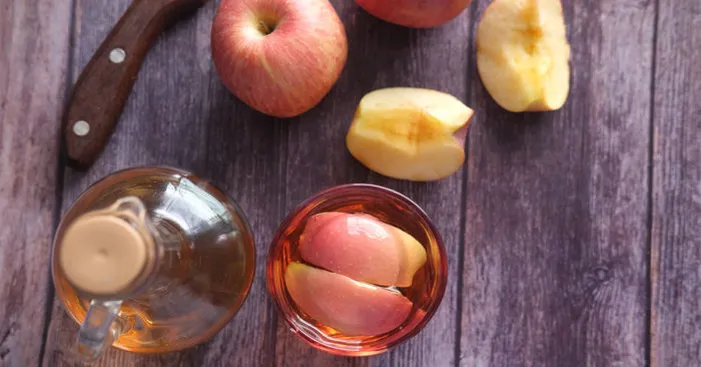
Fruits and vegetables that combine well with apple juice:
Some fruits and vegetables combine well with apple juice in terms of nutrition, taste, and consistency.
For example, apple juice is very good with bananas, strawberry, lemon, grapefruit, mint, celery, pumpkin …
By adding fruits or vegetables to your apple juice recipes you will have a natural apple juice rich in vitamins and micro-nutrients.
Different recipes of apple juice:
Apple juice with orange and strawberry:
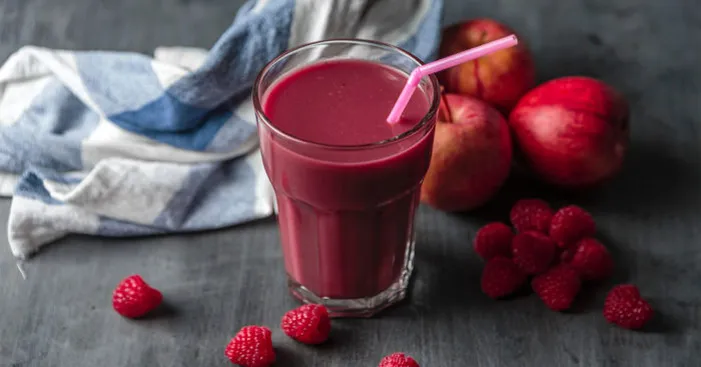
Ingredients:
- 3 chopped apples.
- 1 cup of orange juice or 3 average oranges.
- 1 cup of strawberry juice or 10 strawberries.
- ¼ cup of cream.
- ½ cup of milk.
- 2 tbsp of honey.
Preparation:
- Pour the strawberry juice (or strawberries) and the chopped apples in the blender then blend them for 1 minute.
- Add orange juice, milk, and cream to the blender and blend all the ingredients together for 1 minute under medium speed.
- Serve the juice and enjoy it!
Apple juice with lemonade:

Ingredients:
- 5 apples of your choice.
- ½ cup of lemonade or ½ cup of squeezed sour lemon.
- 3 cups of cold water.
- 3 tbsp of honey.
Preparation:
- Start by cutting the apples into small pieces and cleaning the seeds.
- Place the apple pieces in a blender with one cup of cold water and blend them until you have a homogeneous mixture.
- Now add the remaining 2 cups of cold water and the lemonade and blend the ingredients for 1 minute.
- Pour the juice into cups without filtering it.
- You can decorate the cups with slices of apple or lemon and serve them!
Natural homemade apple juice:
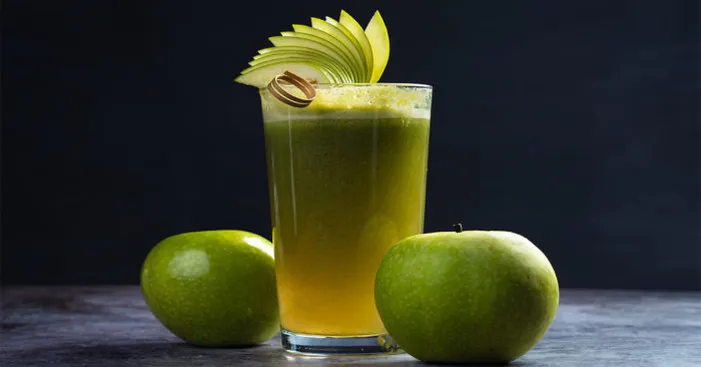
Ingredients:
- 5 average apples.
- 1 cup of cold water.
- 2 tbsp of honey.
- Ice cubes.
Preparation:
- Wash the apples then cut them into pieces and remove their seeds.
- Put the apple pieces in a cooking pot with water and honey and cook them on medium heat until the water loses half of its original volume.
- Take the pot off and let it cool down.
- The pieces of apple are mushy you can either let them in or filter the juice before you store it in the refrigerator overnight.
- You can serve it in cups with ice cubes for an extra refresher.
Choosing the right apple for apple juice:
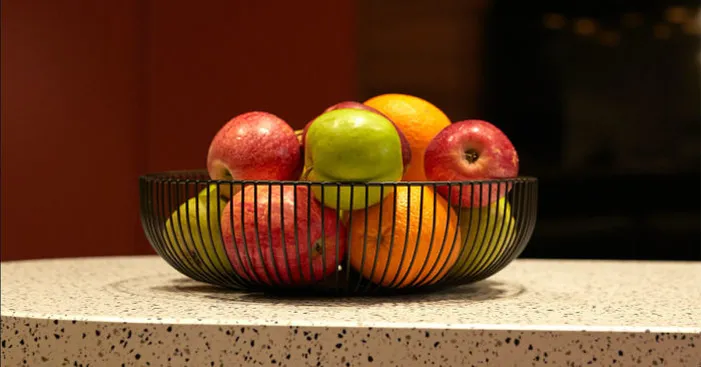
It is so easy to make apple juice, however, some apple types are better than the others in terms of juiciness and taste.
The juiciness of an apple is usually defined by the amount of puree it makes, the less puree the more juice it produces.
There are a lot of apple types to use when you make your own apple juice.
Depending on the variety you choose some would yield more juice and some would require the addition of sugar.
The first tip that applies to any type of apple is to make sure that you only use ripe apples to make juice.
Among the juiciest apple types we mention: (18)
- Granny Smith: some people call it “green apple” which is a firm and crunchy apple with a lot of juice and little fragrance.
- Pink Lady: this apple type is also very juicy with a sweet flavor and a strong apple fragrance.
- Gala: these apples are sweet and juicy with low acidity compared to other types.
- Fuji: One of the juiciest apples with a very sweet flavor.
- Mcintosh: Native to Canada, Mcintosh apples are juicy and have a pronounced apple flavor with hints of pear-like taste.
You can even try and mix different apple types with different doses to make your own unique apple juice recipe.
Don’t forget that most of the nutrients are in the skin, therefore make sure you leave it on ensuring you get all of apple juice nutrition.
Storing apple juice:
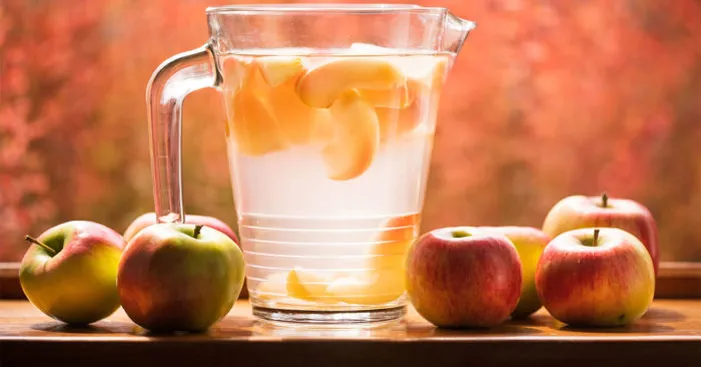
Natural apple juice can remain fresh in the refrigerator for only 2 days after you open the package.
After 2 days, the fermentation process starts which is also the start of its rancidity.
In order to extend its lifespan, there are two main techniques you can try:
- First: you can freeze your apple juice in a sealed bag for up to 6 months.
- Second: You can pasteurize the apple juice and then it will remain fresh for up to 12 months.
- During pasteurization, the organisms responsible for fermentation get destroyed which explains why the juice remains fresh for a longer period.
References:
(1): Juice Nutrition: From Concentrate vs. Not From Concentrate | Livestrong.com
(2): FoodData Central (usda.gov)
(3): 4 Benefits of Apple Juice (And 5 Downsides) (healthline.com)
(4): Polyphenols in fermented apple juice: Beneficial effects on human health – ScienceDirect
(5): Effect of l-ascorbic acid addition on quality, polyphenolic compounds and antioxidant capacity of cloudy apple juices | SpringerLink
(6): Effects of apple juice on risk factors of lipid profile, inflammation and coagulation, endothelial markers and atherosclerotic lesions in high cholesterolemic rabbits | Lipids in Health and Disease | Full Text (biomedcentral.com)
(7): Diluted apple juice ‘as good as’ rehydration drinks for children | Nursing Times
(8): Apple Can Act as Anti-Aging on Yeast Cells (nih.gov)
(9): Familial hypercholesterolemia – Symptoms and causes – Mayo Clinic
(10): Effects of orange and apple pectin on cholesterol concentration in serum, liver and faeces – PubMed (nih.gov)
(11): Apple Juice: It Does a Heart Good – Scientific American
(12): A glass of apple juice a day ‘can help keep asthma away’ | London Evening Standard | Evening Standard
(13): Cancer chemopreventive potential of apples, apple juice, and apple components – PubMed (nih.gov)
(14): Apples juices and fresh squeezed juices for your wellness. (melinda.it)
(15): Does Apple Juice Help Constipation? | New Health Advisor
(16): Stomach ulcer – NHS (www.nhs.uk)
(17): Soft Drink and Juice Consumption and Risk of Pancreatic Cancer: The Singapore Chinese Health Study (nih.gov)
(18): Best Apples for Juicing | Apple for That (stemilt.com)
